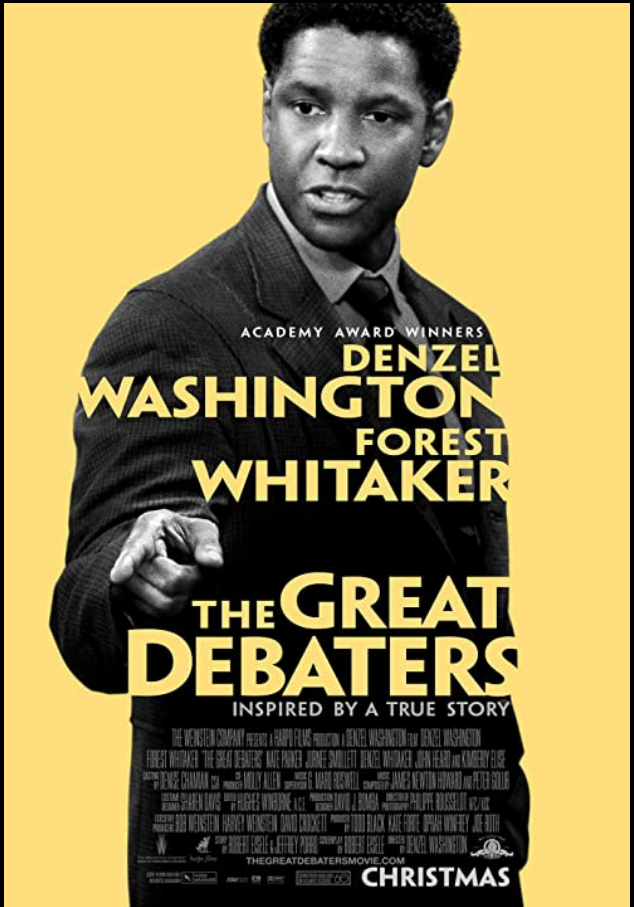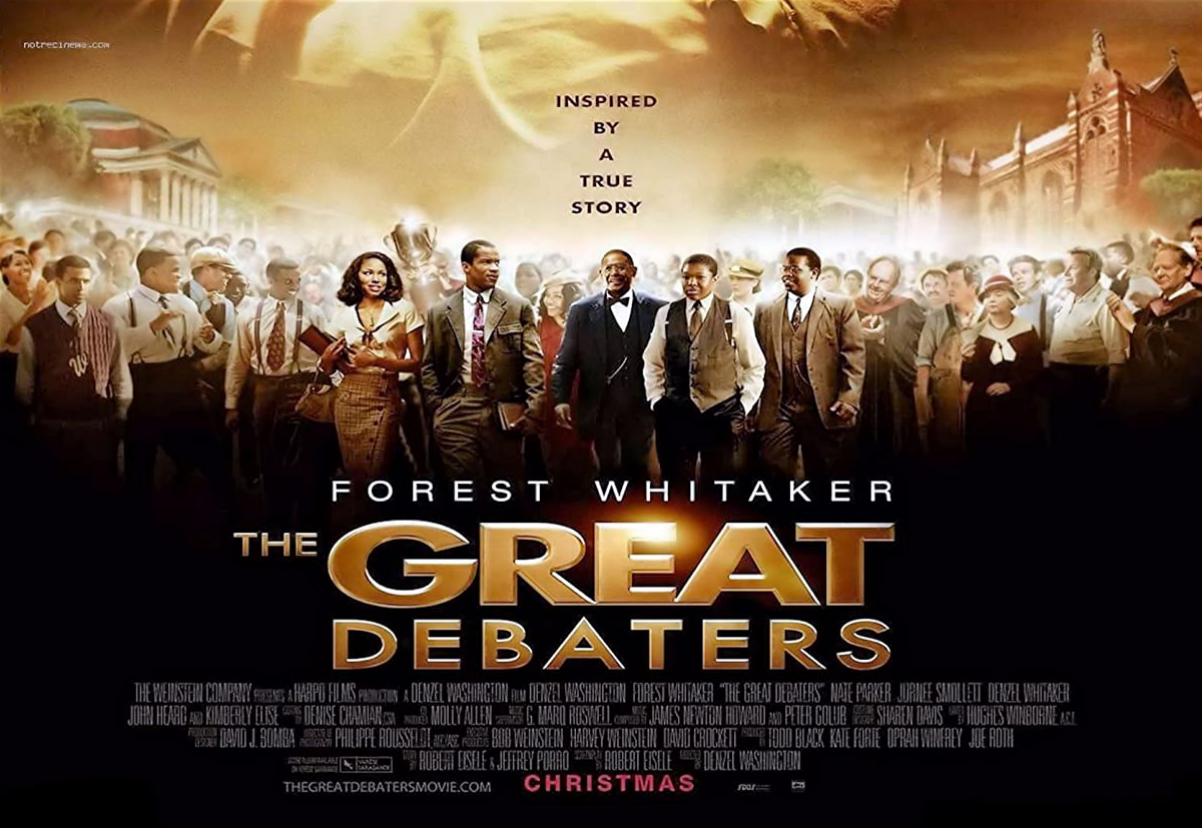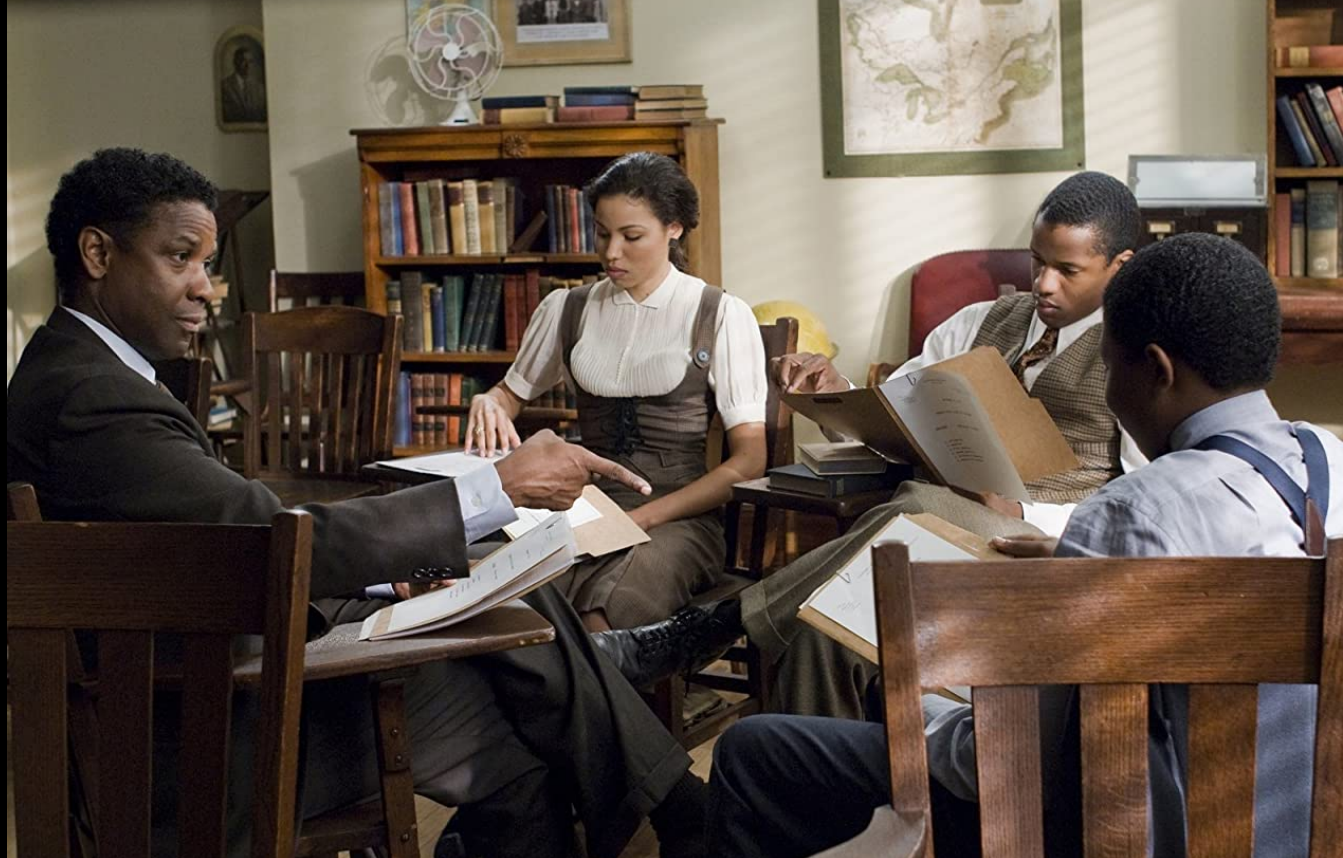[ENG/ESP] The Great Debate is a film on the subject of racism and the importance of pacifist debates. / El Gran Debate es una película sobre el tema del racismo y la importancia de los debates pacifistas.

The Great Debaters is a 2007 film based on a true story directed by and starring Denzel Washington.
The film is set in 1935, and has as its epicenter the real life of Professor Melvin B. Tolson, in the state of Texas.
The Great Debaters (El Gran Debate) es una película basada en una historia real del año 2007 dirigida y protagonizada por Denzel Washington.
La película está ambientada en el año 1935, y tiene como epicentro la vida real del profesor Melvin B. Tolson, en el estado de Texas.

And if we talk about the 1930s and we refer to Texas, it is impossible not to make a direct allusion to racism, to the Ku Klux Klan (the unfortunately notorious American white supremacist extreme right-wing hate group, known for promoting violent acts against the African-American population) and to the social segregation of its inhabitants according to the color of their skin.
But the film itself, while it is a vindication of this sector of society, is also a true vindication of the power of the word, of oratory. As if to say: "let's show what we are and what we are worth through our speech and not through our actions".

Y si hablamos de los años 30 y nos referimos al Texas es imposible no hacer una alusión directa al racismo, al Ku Klux Klan (el lamentablemente notorio grupo de odio de extrema derecha supremacista blanco estadounidense, conocido por promover actos violentos sobre la población afromaericana) y a la segregación social de sus habitantes de acuerdo al color de su piel.
Pero la película en si misma, si bien es una reivindicación de este sector de la sociedad es también una verdadera reivindicación del poder de la palabra, de la oratoria. Como decir: "demostremos lo que somos y lo que valemos a través de nuestro discurso y no de nuestras acciones".


Professor Tolson, faithful to this pacifist principle of vindication of the black population through instruction, begins his play by selecting more than 300 students, then reducing them to 45 to end up with only 4.
They are: Henry Lowe (whom ProfessorTolson himself saves a few days before a possible assassination in a street fight), Samantha Booke (the only and first woman to participate in the experience when the female sector was - almost - totally excluded from American social life and from instruction in general), James Farmer Jr. (fourteen-year-old son of the illustrious James Farmer, pacifist and famous for having led the Civil Rights Movement.) and finally Hamilton Burgess.
In this group there will be two starters and two alternates who will have to participate in debates with other schools until they reach the grand final. The Great Debate.
And so between memories, memory of the teacher and teachings left by their ancestors begins the real formation of the group, learning a new lexicon among which stands out the word "lynching" an action with which more than one black paid with his life, and know that the origin of that word is due to the surname of the slaver Willy Lynch who used this method to punish his slaves.
The first debate is against the Paul Quinn College, a famous university reserved for upper class blacks. Citing the Latin phrase solitudinem faciunt, pacem apelante (a maxim of law and a phrase attributed to Publius Cornelius Tacitus when Galgacus alludes to the cruelty and ambition of the Romans, who justified their conquests and devastations under the pretext of civilization) they manage to win and move on.
Until they reach the final encounter with Harvard University, a famous center of learning in the hands of a white majority.

El profesor Tolson, fiel a este principio pacifista de reivindicación de la población negra a través de la instrucción, comienza su obra seleccionando más de 300 estudiantes, reduciéndolos luego a 45 para terminar con solo 4.
Ellos son: Henry Lowe (a quien el mismo profesor Tolson salva unos días antes de un posible asesinato en una pelea callejera), Samantha Booke (la única y primera mujer en participar en la experiencia cuando el sector femenino estaba -casi- totalmente excluído de la vida social americana y de la instrucción en general), James Farmer Jr. (catorce años, hijo de el ilustre James Farmer pacifista y famoso por haber liderado el Movimiento por los Derechos Civiles) y finalmente Hamilton Burgess.
En este grupo habrá dos titulares y dos suplentes que deberán participar en debates con otros colegios hasta llegar a la gran final.
Y asi entre recuerdos, memorias del profesor y enseñanzas dejadas por sus antepasados comienza la verdadera formación del grupo, aprendiendo un léxico nuevo entre el cuál se destaca la palabra "linchamiento" una acción con la que más de un negro pagó con su vida, y saber que el origen de esa palabra se debe al apellido del esclavista Willy Lynch que usaba ese método para castigar a sus esclavos.
El primer debate es contra el Paul Quinn College famosa universidad reservada a los negros de clase alta. Citando la frase latina solitudinem faciunt, pacem apelante (es una máxima del derecho y frase atribuída a Publio Cornelio Tácito cuando Galgaco hace alusión a la crueldad y ambición de los romanos, que justificaban sus conquistas y devastaciones con el pretexto de civilización) logran vencer y seguir adelante.
Hasta llegar al encuentro final con la Universidad de Harvard, celebérrimo centro de enseñanza en manos de una mayoría blanca.


Denzel Washington: Melvin B. Tolson
Forest Whitaker: Dr. James Farmer
Denzel Whitaker: James Farmer Jr.
Devyn A. Tyler: Helen Farmer
Gina Ravera: Ruth Tolson
Jermaine Williams: Hamilton Burgess
John Heard: Sheriff Dozier
Jurnee Smollett: Samantha Booke
Kimberly Elise: Pearl Farmer
Nate Parker: Henry Lowe


It is clear that segregation is a sentiment that has permeated Denzel Washington's cultural and acting DNA.
From his unforgettable Philadelfia where segregation is based on homosexuality to The Great Debate in which segregation is more direct and has to do with skin color, these themes have been the central argument of many of his films.
But in this case the claim goes beyond the difference between black and white. One cannot convince the other if I am not convinced of my own theory. That is the moral of The Great Debate.
To debate and convince with the force of theory and not with action and the force of facts. Some call it pacifism. But I think the issue goes beyond that. It points to the diologue, to education, to knowledge to overcome certain barriers.
And that limit can be overcome only if people are taught to think and to understand what works and what does not work, what is morally acceptable and what is not.
We could say that everything, in the end, is a matter of principle.
Es evidente que la segregación es un sentimiento que ha calado muy a fondo en el ADN cultural y actoral de Denzel Washington.

Desde su inolvidable Philadelfia donde la segregación se basa en la homosexualidad hasta El Gran Debate en el que la segregación es más directa y tiene que ver con el color de la piel estas temáticsas han sido el argumento central de muchas de sus películas.
Pero en este caso la reivindicación va más allá de la diferencia entre blanco y negro. No se puede convencer al otro si no estoy convencido yo mismo de mi teoría. Esa es la moral de El Gran Debate.
Debatir y convencer con la fuerza de la teoría y no con la acción y la fuerza de los hechos. Algunos lo llaman pacifismo. Pero creo que el tema va más allá. Apunta al diólogo, a la educación, al conocimiento para superar ciertas barreras.
Y ese límite se puede superar solo si se le enseña a la gente a pensar y a entender que es lo que funciona y que es lo que no funciona, lo que es moralmente aceptable y aquello que no lo es.
Podríamos afirmar que todo, en definitiva, es una cuestión de principios.

The HIVE divider -modified by the author of the article- is from the user ThePeakStudio. To him goes my thanks for making it available to any user completely free of charge.
El separador HIVE -modificado por el autor del artículo- es del usuario ThePeakStudio. A él va mi agradecimiento por ponerlo a disposición de cualquier usuario en forma totalmente gratuita.
Thanks for reading!!! / Gracias por leer!!!











Comments